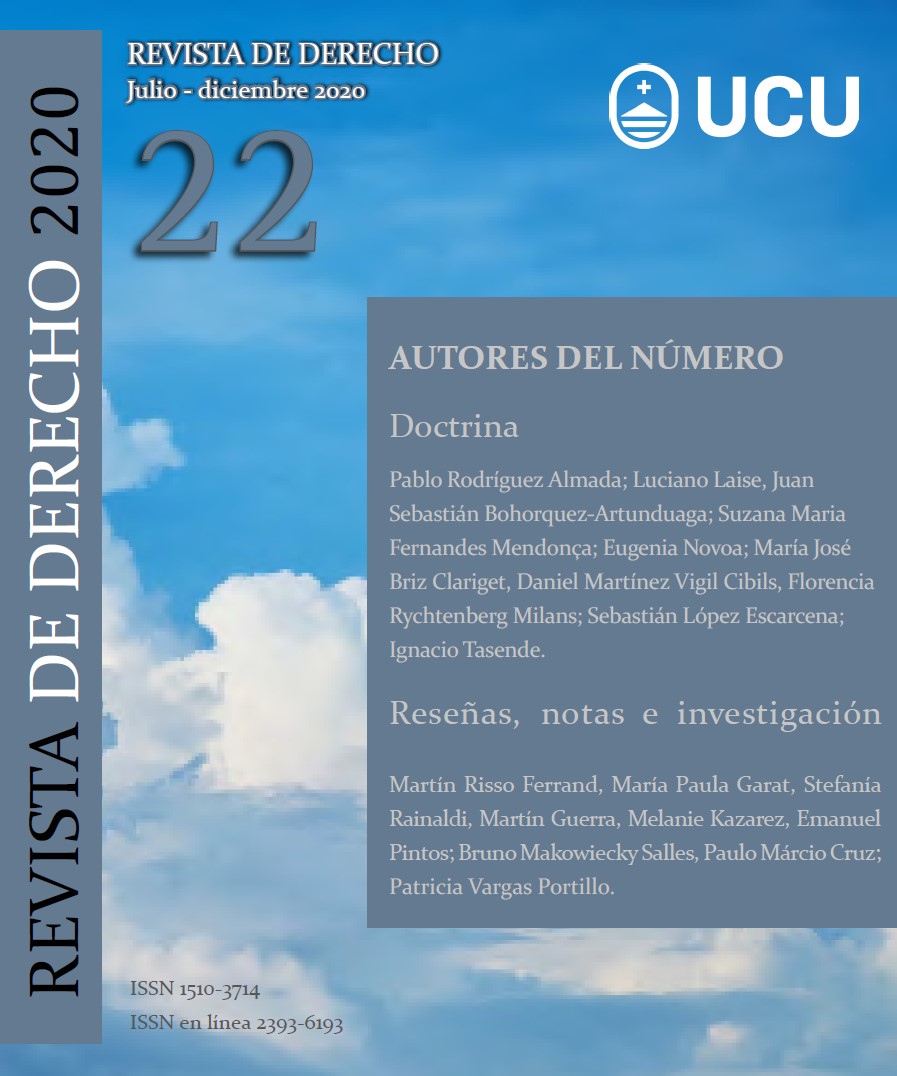Writ of mandamus in Uruguay. Follow-up research
DOI:
https://doi.org/10.22235/rd22.2246Keywords:
writ of mandamus, human rights, State, constitutional law, Constitution, Law 16.011, protection of human rightsAbstract
The purpose of this publication is to adjunct a research, already published on Revista de Derecho n. 16 (July-December, 2017). In said research, it was made apparent that the vast majority of petitions for writs of mandamus were denied by the courts. This follow-up research aims to verify if said tendency remained unaltered and methodize the reasons given by the judges to deny the petitions, in order to, in the end, propose an amending act which intends to allow the writ of mandamus to achieve its intended purpose, that is, to be a remedy for cases where human rights are violated. So as to achieve that, all final decisions from a Civil Court of Appeals regarding a writ of mandamus petition between October 2018th and September 2019th were collected. Then, all decisions regarding “medical writs of mandamus” were discarded, as well as all petitions not aimed against the State. The decisions that were left, were then divided by its result and, finally, each was scrutinized on the reasons given by the court for its judgement. In total, three hundred and sixty decisions were issued, of which only twenty-two were “not medical writ of mandamus”. Twenty of them were rejected based on a strict interpretation of the requirements of the law N° 16.011, with no regards of the constitutional principles on the matter nor the hermeneutical rules in cases involving human rights.
Downloads
References
Barnech, C. (2016). El juez como garante último de la protección de los Derechos Humanos – Panorama desde la acción de amparo y la problemática de los medicamentos de alto costo. Recuperado de https://liberi.ucu.edu.uy/xmlui/handle/10895/571
Cassinelli Muñoz, H. (1988). Acción de amparo. Revista de la Oficina Nacional del Servicio Civil.
Gros Espiell, H. (2006). La acción de amparo en Uruguay. En H. Fix-Zamudio y E. Ferrer Mac-Gregor, El derecho de amparo en el mundo (pp. 633-647). México D. F., México: Porrúa/Universidad Nacional Autónoma de México/Konrad Adenauer Stiftung.
Guerra, W. (2008). Amparo para tutelar derechos fundamentales violados en cárceles del Uruguay. Revista Uruguaya de Derecho Procesal, 2, 219-235.
Nogueira Alcalá, H. (2015). El Bloque Constitucional de Derechos En Chile. El Parámetro de Control y Consideraciones Comparativas Con Colombia y México: Doctrina y Jurisprudencia. Estudios Constitucionales, 13(2), 301–350. https://doi.org/10.4067/S0718-52002015000200011
Ochs, D. (2013). La acción de amparo. Montevideo, Uruguay: Fondo de Cultura Universitaria.
Real, A. R. (1963). La acción de amparo en la jurisprudencia argentina y ante el derecho uruguayo. Revista de la Facultad de Derecho y Ciencias Sociales, 14(1).
Risso Ferrand, M. (2011). ¿Qué es la Constitución? Montevideo, Uruguay: Universidad Católica del Uruguay.
Risso Ferrand, M. (2015). La acción de amparo. Estudios de Derecho Administrativo, 12, 463-499.
Risso Ferrand, M., Garat, M. P., Rainaldi, S., Rodíguez Galusso, A., y Techera, L. (2017). Jurisprudencia sobre responsabilidad del Estado: Avances de investigación. Revista de Derecho, 16, 197-238. https://doi.org/10.22235/rd.v2i16.1479
Viera, L. (1993). La ley de amparo. Montevideo, Uruguay: Ediciones IDEA.














